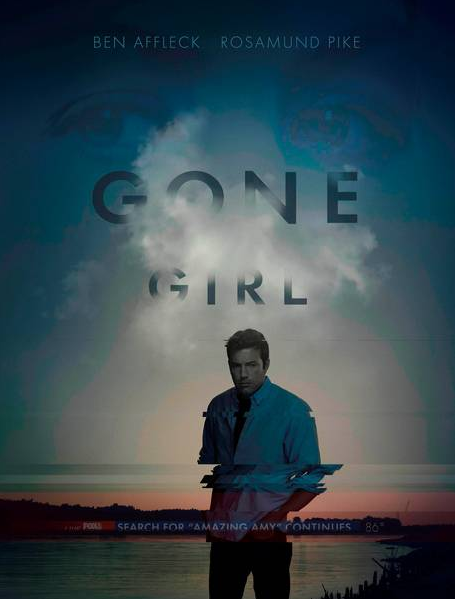
Marriage is hard — that is a fact. Anyone who has found themselves in the confines of this sacred institution for more than a few months can attest to the reality of this truth. But for the Dunnes, a “hard” marriage would be a step up from the depraved one that they share. That is the marriage of which the unsuspecting viewer is provided a hideous glimpse when they enter the theaters to watch Gone Girl. It is one that defies rationale, and one that will likely leave the viewers reeling long after they’ve left the theater.
Nick Dunne (Ben Affleck) and his wife Amy (Rosamund Pike) are miserable, and anyone who has observed the two of them even from a distance could attest to that. And so when Amy goes missing on the morning of their fifth wedding anniversary, it does not take long before the town, the police, and the media suspect that her husband played a role in her disappearance.
The cause of Amy’s disappearance is in fact the primary focus of the film. There are plenty of indications that Nick could very well have been involved, but there are also a number of reasons to believe otherwise. The film continuously fluctuates between the past and present so as to provide a rather jig-sawed presentation of what has happened and is still taking place, and it is the viewer's job to piece it all together.
And just when you think that you've got it all figured out, you find that all you thought you knew is only part of the equation.
Any review of this film must by necessity be short as to avoid exposing any of the story's best and most surprising elements.
What is worth noting is this: Author Gillian Flynn, the author of the novel on which the movie is based, is a genius and, whether she has a degree in psychology or not, has mastered an understanding of sociopathic personalities.
Gone Girl is multiple stories in one. It is a mystery, and a very dark comedy. It is a thriller and it is a scientific mind-game, both for those involved as well as those watching the story play out. You cannot walk away from the conclusion of this film and feel good about the world, about human nature or about marriage, or at least not a marriage of two sociopaths.
On the subject of marriage in the film, Movieguide — which analyzes films with a particular focus on their morality and spirituality — observes that Gone Girl "makes marriage sound like an unpleasant emotional and psychological prison or war zone." It adds, "While they are indeed just one couple, the movie shows no balance of happy marriages or families. This fact leaves one to assume that Flynn and Director David Fincher are attacking the institution of marriage itself."
However, careful observation of the film, and a close reading of the novel, ultimately reveal that it is not marriage that is the problem, but the Dunnes' marriage. There is essentially something so wrong with the both of them that it would be nearly impossible for their marriage to be successful or happy.
And despite the many opportunities for redemption, there is absolutely none in this story. After all, the author herself admits, "The book isn’t to me about justice; there’s nothing in the book that has any sort of hint that there’s going to be justice."
But Dunne's story is intriguing from start to finish. Brutally violent, diabolical, sadistic, sad, and yet fascinating, it is sharp and full of remarkable character development that up until the moment you read this book or watch this film, you had not realized was missing from so many of its contemporaries.
The film stays amazingly close to the novel, most likely because the same author who penned the story also wrote the screenplay — a wise choice, as it is not likely anyone but the person who masterminded this tale could have done it justice.
All the key actors in Gone Girl were superb in their roles, but none more than its two main characters. Affleck bears such a striking resemblance to real-life men who have found themselves in a similar position that he becomes someone viewers despise and yet with whom they empathize. The question continues to present itself throughout the book and the movie: Did he do it? Affleck does a wonderful job of creating that suspense.
And what can be said about Rosamund Pike but this: She has the outstanding ability to portray multiple characters. Watch the movie and see if you agree.
This is not a film for anyone who needs a pick-me-up. However, if it is your intention to be drawn in by an intense tale for two and a half hours that will continue to have you guessing and second guessing, then Gone Girl is a wise choice. It is the sort of movie that will dominate the conversation for hours, perhaps even days, after seeing it because of all the layers that require unpacking. Better yet, read the book first. It equips you with even further insight into this wicked world of narcissism and sociopathy to which Nick and Amy belong. As usual, the book is better than the film, as it delves much deeper into the psychology of the two main characters.
Gone Girl is unlike anything you've likely seen or read in a long time. Its brutal violence, foul language, and sexual content mean it is definitely inappropriate for younger audiences, and for any moviegoer who ultimately believes that films should leave more to the imagination.




